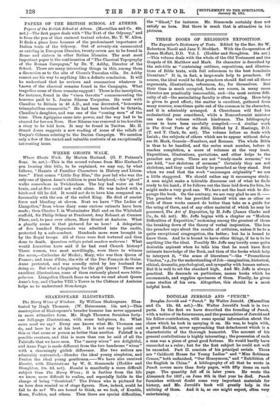THREE BOOKS OF RELIGIOUS EXPOSITION.
The Expositor's Dictionary of Texts. Edited by the Rev. Sir W. Robertson Nicoll and Jane T. Stoddart. With the Co-operation of James Moffatt, D.D. VoL I. (Hodder and Stoughton. 25s. net.) —This volume deals with the whole of the Old Testament and the Gospels of SS. Matthew and Mark. Its character is described by the sub-title as "containing outlines, expositions, and _illustra- tions of Bible texts, with full references to the beat homiletic literature." It is, in fact, a large-scale help to preachers. Of course the ideal would be that preachers should find out all these arguments, illustrations, references, &c., for themselves. But their time is much occupied, books are scarce, in many cases libraries are practically inaccessible, and—the most serious diffi- culty of all—the assimilating faculty is often wanting. Here help is given to good effect; the matter is excellent, gathered from many sources, sometimes quite out of the common in its character, and it is admirably arranged. I Churchman will find his ecclesiastical year considered, while a Nonconformist minister can use the volume without hindrance. The bibliography seems to have been carefully compiled.—A. similar work is The Great Texts of the Bible, Edited by I. Flutings, D.D. (T. and T. Clark, 6s. net). The volume before us deals with Isaiah ; the subjects of others which are to appear without delay are St. Mark, Genesis—Numbers, and Romans. The whole Bible is thus to be handled, and the series must number, before it reaches completion, a score of volumes at the very least. Expositions, illustrations, quotations, and other helps to the preacher are given. These are not "ready-made sermons," we are told, "nor skeletons of sermons." Certainly they are not skeletons, and they could hardly be preached as they stand. But when we read that the work "encourages originality" we are a little staggered. We should rather say it encourages study. A man might make a tolerable discourse out of what he finds ready to his hand ; if he follows out the lines laid down for him, he might make a very good one. We have not the least wish to dis- parage the book. On the contrary, we are very glad to see it. — The preacher who has provided himself with one or other or both of these works cannot do better than take as a guide for the using of them, and of any other material of which he may be possessed, The Art of Exposition, by H. Jeffs (James Clarke and Co., 3s. 6d. net). Mr. Jeffs begins with a chapter on "Modern Difficulties of Exposition," reckoning among the greatest of these the breaking down of the theory of verbal inspiration. The less the preacher says about the results of criticism, unless it be to a quite exceptional congregation, the better; but he is bound to know them. And he is bound to have other things, if he is to be anything like the ideal. Possibly Mr. Jeffs may terrify some quite desirable aspirant when he tells him that he must have first intimate knowledge of the Book, and then of the books which help to interpret it, "the sense of literature "—the "Prometheus Vinctus," e.g., for the understanding of Job—imagination, historical, ethical, dramatic, psychological, and sympathy with human nature. But it is well to set the standard high. And Mr. Jeffs is always practical. He descends on particulars, names books which he recommends, and supplies specimens of them. Finally, he gives some studies of his own. Altogether, this should be a most helpful book.






















































 Previous page
Previous page